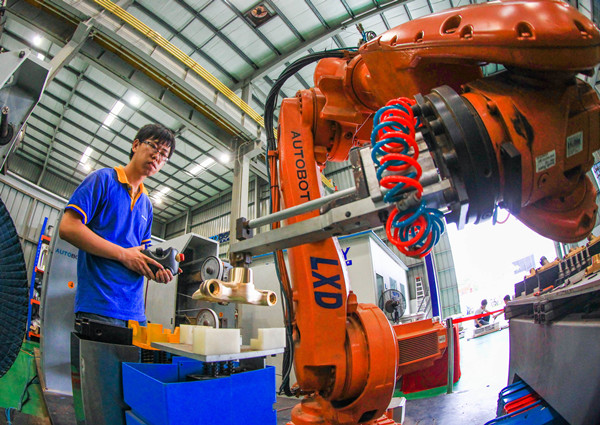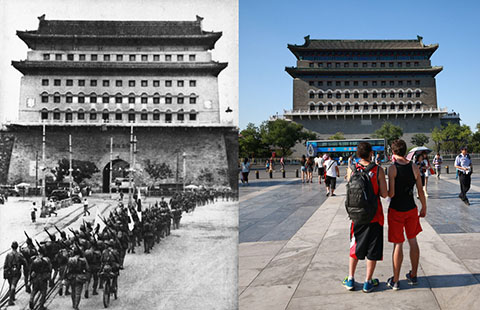A brave, new world of robots
Updated: 2015-07-08 23:37
By Qiu Quanlin(China Daily)
|
|||||||||
 |
|
A worker assembles a robotic arm at a factory in Foshan, Guangdong province. Provided to China Daily |
It may seem like science fiction, but robots really are on the rise.
As manufacturing costs surge and labor shortages worsen, one of the industrial heartlands of China is turning to advanced technologies to stay competitive.
Already incorporated on the frontline of plants in the Pearl River Delta, a major manufacturing region in South China, high-tech production is seen as the long-term answer to future growth. With industries as diverse as garment manufacturing and smartphone production vying for export orders in a crowded global marketplace, finding that competitive edge is crucial.
"By using 60 industrial robots, an assembly line that would have needed about 600 workers in the past now needs just 100," said Luo Weiqiang, assistant general manager of Guangdong Everwin Precision Technology, which designs, manufactures and sells electronic components.
"Production efficiency has also greatly improved after the introduction of industrial robots," he said.
The company, which was set up in 2010 and has a factory in an industrial park in Dongguan, southern Guangdong province, plans to have 1,000 robots when it upgrades its production lines this year. With recruitment now a major problem in the Pearl River Delta, this robotic labor force will do the work of 3,000 employees.
"The use of smart equipment will help the company to tackle the labor shortages," Luo said. "We will only need to recruit fewer than 200 software technicians and management personnel when the industrial robots are installed."
The labor shortage has become a major problem for companies looking to develop and expand in Guangdong, which last year contributed about one-fourth of the country’s manufacturing trade, or 6.61 trillion yuan ($1.07 trillion).
According to the local authority in charge of human resources and social security, the province needs 600,000 to 800,000 more workers.
In Foshan city's Shunde district, in the heart of the Pearl River Delta, the difficulties in recruitment are acute. This manufacturing hub is known for making home appliances, ceramics and furniture, but last year it reported a shortage of 200,000 workers, according to Zhang Peng, deputy director of Shunde Economy, Science and Technology Bureau.
"The introduction of smart equipment will help solve the problem and improve working conditions for existing workers," he said.
He predicted that up to half of the employees on production lines in Shunde will disappear in the coming years, as manufacturers upgrade their facilities by using smart or robotic technology.
Companies have invested more than 700 million yuan toward introducing more than 1,500 industrial robots this year.
Midea Group, which makes home appliances, for example, said it has installed more than 800 robots and, as a result, production efficiency is now 10 percent higher.
In China, demand for industrial robots has increased dramatically. Last year, sales of robotic technology reached 5.6 million units, up 54 percent compared with 2013, Xinhua News Agency reported.
"The demand will continue to rise as China needs more-advanced equipment to upgrade its manufacturing," Zhang said.
Home appliances made in Shunde were worth 228.1 billion yuan last year, accounting for 15 percent of the country’s total output, and that is likely to increase in the future, too.
"The industry has laid solid foundations for the expansion in industrial robot technology, which will raise production," Zhang said. For workers left without jobs, authorities have promised to provide training courses to help them find new ones. The booming robotics industry is also expected to create employment opportunities.
"A growing number of companies are manufacturing industrial robots in the Pearl River Delta,” said Xie Guogao, deputy director of the Foshan Economic and Information Bureau.
Figures released by Shunde Economy, Science and Technology Bureau show that more than 20 companies in the district make industrial robots. Many are joint ventures with international partners, such as the Zurich-based ABB, one of the world’s leading engineering companies, and Comau, which specializes in advanced manufacturing in Italy.
The authorities in Shunde now plan to build an industrial robot park and establish a research institute.
"These companies will create new jobs for workers replaced by smart equipment in other manufacturing sectors," Xie said.
Liu Mei, an HR official working in training and employment for the Foshan government, echoed this view, and said training courses in technology will be available to workers to equip them with the skills needed in this brave, new automated world.
"Moreover, the booming tertiary education industry will provide more jobs for workers previously on production lines," she added.
GMCC, a leading supplier of compressors, has retrained employees from the production line and turned them into technicians, overseeing the automated systems. They are providing training and academic courses for workers.
- Injured ROK tourists in intensive care
- 36 dead, 26 missing after banca capsized in C. Philippines
- Thai navy plans to buy three Chinese subs
- Mass casualties in Indonesian military plane crash
- Japan's LDP lawmaker denounces Abe's security policies
- More than 100 feared dead in Indonesian military plane crash

 Then and Now: Beijing’s historic sites as witnesses of war
Then and Now: Beijing’s historic sites as witnesses of war
 In photos: China from above
In photos: China from above
 Serena Williams beats sister Venus to reach last eight
Serena Williams beats sister Venus to reach last eight
 Culture insider: Six things you may not know about Minor Heat
Culture insider: Six things you may not know about Minor Heat
 Fancy sculptures sparkle in Chongqing
Fancy sculptures sparkle in Chongqing
 Ten photos you don't wanna miss - weekend special
Ten photos you don't wanna miss - weekend special
 US beat Japan 5-2 to win Women's World Cup
US beat Japan 5-2 to win Women's World Cup
 Veterans of World War II honored
Veterans of World War II honored
Most Viewed
Editor's Picks

|

|

|

|

|

|
Today's Top News
China shares listed in US see selling
China answers Clinton charges
President Obama addresses IS threat
China has ability to deal with risks to economy: premier
Govt prefers peaceful means in resolving maritime row: Envoy
China predicts Greece to stay in eurozone
Chinese stocks struggle to maintain rally in afternoon
Greece enters uncharted territory after referendum 'no' vote
US Weekly

|

|







